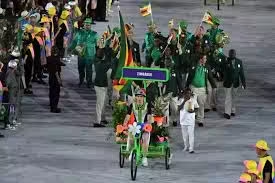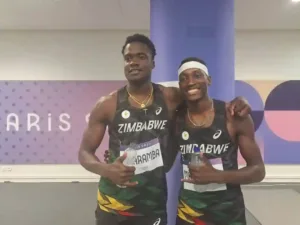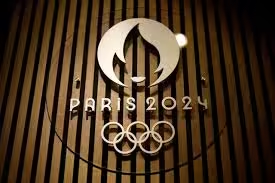By Noah POMO – Zimba Wave Media- HARARE

The Olympics are often a stale set order in which American athletes are expected to win Gold. Either that or someone from Europe, Asia, South America, Middle East or Australia is just too good. Kirsty Coventry (Zimbabwe) upset that order in 2004 in Athens by winning gold. In total she has 7 Olympic medals and 5 world records. By winning her 7 Olympic medals she added to Zimbabwe’s solitary gold medal in 1980 which was won by the Golden Girls of 1980 at independence. It often breaks my athletic heart when somehow people begin to take for granted Coventry’s achievement, an African record still standing.
The Olympics rarely present shock results and appearances. This has been the Olympics of shocks. One such shock result was Letsile Tebogo’s gold in the mens’ 200m sprint event. By winning this event, Botswana’s Tebogo caused a stir.
United States’s Noah Lyles bombastically declared in the pre-match press conference before the race that: “I will be winning.”Lyles said: ‘None of them is winning. When I come off the turn, they will be depressed.’ ‘They’ referred to, among others Tebogo of Botswana, Kenneth Bednarek and the Zimbabwean duo of Makanakaishe Charamba and Tapiwanashe Makarawu.

Charamba and Makarawu earned their places in the finals. They didn’t get there by default. Let’s examine the context of the achievements of the Zimbabwean boys barely in their 20s. That Zimbabwe even had 2 athletes in the final is a phenomenal achievement in itself. Before this ,the national best in an Olympic sprint race was a commendable semi–final qualification. Their extended participation in itself was a record broken, and broken symultaneously by 2 athletes. They came within 2 or 3 seconds of winning the race itself or being on the podium.
Lyles began his wild celebrations before the race. He will surely have learned his lesson because in the end he was grateful to come third. The Zimbabweans in lanes 2 and 3 have expressed regret that had they been sandwiched anywhere near or between the 3 medal winners, the results could have been even more interesting. Such is the deceptive nature of track races when curves are a factor.
Lyles came third in the final. He blamed this on a positive covid test earlier in the week. Sadly, his explanations further overshadowed the marvelous achievements of Tebogo (winner) and Bednarek (second). It looks like Lyles lost the race, rather that that Tebogo won it. Which makes very uncomfortable reading.
The world has to get used to upsets from Africa and these upsets are coming from African countries other than Nigeria and South Africa with bigger economies. Muzala Samukonga won Zambia’s first medal (bronze) in 28 years in the 400m race.
True, the upset could have come from Zimbabwe but this does not mean the 2 boys were failures. They were winners. We risk not enjoying this great moment enough because of ‘what could have been.’ The Olympics return in a few years. The boys may very well win medals in their prime. but this was the beautiful moment, when 3 Southern Africans embraced in celebration of the Botswanan gold medal.
Nostalgia was created for sport. The records will show just how far these boys came. Training hurts. Athletes exercise restraint and self-denial. And they should cherish this moment.
Kirsty Coventry was a world virtuoso.
Nick Price was a three-time golf Major champion, World Golf Hall of Fame member and one of the best players of his era. The Zimbabwean, won 18 times on the PGA Tour, earned two PGA Tour Player of the Year Awards (1993, 1994), and spent 43 weeks as the No. 1 player in the world.
Bruce Grobelaar is considered one of Liverpool’s best ever goalkeepers (1981-1994) with 6 league titles, 3 FA cups, 3 league cups and could have added to his 1 Champions league had Liverpool not been banned from Europe due to footballing disasters. He was the decisive figure in that 1984 Champions league final.
The fabled Hockey Team of Golden Girls 1980 took the first Zimbabwean Olympic gold, until Kirsty Coventry’s 7. Makarawu and Charamba came within seconds of adding to that tally.
An optimistic Nigel Chanakira rightly observed that Makarawu was now the 6th fastest man IN THE WORLD. By extension Charamba can be considered 8th. A slight improvement in either athlete’s figures could surely cause, what won’t be an upset at the next Olympics, right at their peak but still, into their old age, when it eventually comes, this result will still bring a smile and not just a “what if” or “if only.” It’s a cause for celebration.
There are some for whom first is everything and second is nothing. That’s too pessimistic. Positivity improves chances of winning next time.
Charamba and Makarawu may want to study Peter Ndlovu’s story. The boy from Makokoba in Bulawayo. The fast footed footballer was born in a family of 11. His 2 brothers Madinda and Adam played for Highlanders first. At 17 Peter played for Highlanders and debuted for Coventry City in England not long afterwards and became the first Zimbabwean to play in the rebranded English Premier League in August 1992.
What’s there to learn? As much as Ndlovu is respected for his club achievements his desired achievements was a first qualification for Zimbabwe to either Afcon or The World Cup. It took Ndlovu 6 attempts to lead Zimbabwe to Afcon. The World cup was elusive because access for African countries was limited. He managed it twice in 2004 and 2006 as captain. The lesson is things may take time.
Still, Ndlovu’s Dream Team meets with the cynical question sometimes: ‘What did they win?’ This ignores the merit of participation and qualification. Some sports fans are also glory hunters. It has been said: “Success has many fathers but failure is an orphan.” This is not true in the case of the 2 Olympians. Africa its breath for 22 seconds. When they breathed an African was the winner.
The reserves of talent were clearly in evidence as 3 African boys were in that race. Just how much more talent and potential is there on the continent just waiting to be discovered? Sadly naturalization is taking some of the guys to compete for overseas nations reducing competitiveness of Nigeria and Cameroon especially in football. Kylian Mbappe, N’golo Kante, Patrick Vieira, Claude Makelele are soccer World cup winners with France for example but Tebogo, Charamba and Makarau are evidence that the time is coming when home grown African talent will strike even more gold.
Former Manchester City player, Benjani Mwaruwaru, on his retirement testimonial in Harare brought Olympic Gold Medalist Kanu Nwanku and El Hadji Diof of Senegal. Their careers were full of commendable moments in which Africans reached World Cup Quarter finals. Morocco broke that record and reached the finals.
The psychology to break down barriers is shown in the growing endurance by African athletes in international competitions and these experienced athletes will have children who can carry on the baton stick to victory.

Don Black competed at Wimbledon with an honorary placing in 1953 and 1956. He also played at the French open in 1956. Black was inspired to train his 3 kids Byron, Wayne and Cara to become tennis players. A typical day began with 5am tennis practice at their Highlands home. They were all especially stronger in doubles tennis and competed in US,Australia and Europe while also competing for Zimbabwe in The Davis Cup at the very top. Family friend Kelvin Ulyett also joined them.
The cricket world remembers fondly the different generations of Zim cricketers for their regular upsets of the stablished order of Australia, India, Britain and others.
Zimbabwe is a sporting nation with talent and potential to excel on the world stage. As we speak, Marvellous Nakamba has been competing in the English premier league with Aston Villa and Luton since 2019.

